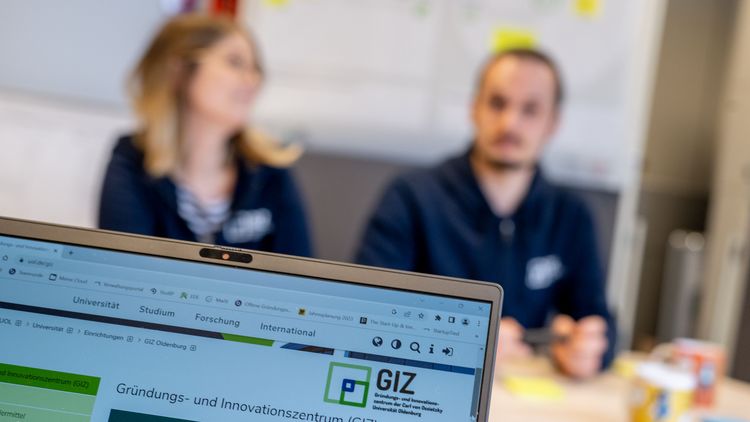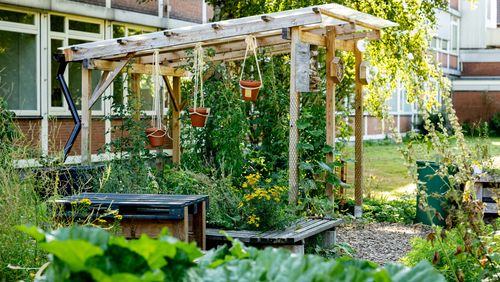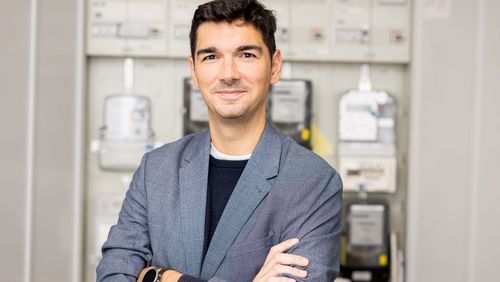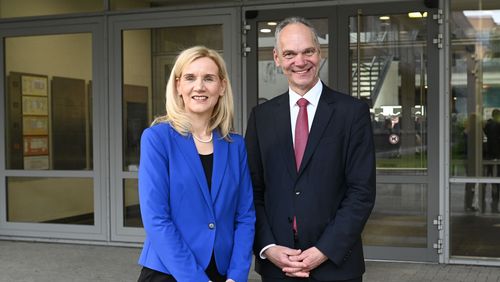The university interlinks start-ups and sustainability at all levels – research, teaching and consultancy. Those interested in launching a company receive comprehensive support right from the start.
From locally manufactured office furniture to organic seed coatings and online job-sharing platforms – the university offers advice and support for a wide range of business models and is particularly successful when it comes to start-up projects in all areas of sustainability, whether environmental, economic or social. "Sustainability is not just taught at the university, it is also practiced there," the Stifterband für die Deutsche Wissenschaft emphasized in its latest Start-Up Radar report (Gründungsradar). The report highlights the university's performance in this area by presenting it as a successful case study (see p. 1). The topic of sustainability is "deeply embedded in the university's DNA", it concludes.
In Oldenburg, the university's Founding and Innovation Center (GIZ) also provides professional support in the area of sustainability through various formats. It offers open start-up consultations on the topic of sustainable and social business models, and its Gründungschecks — a checkbook with consulting vouchers for young entrepreneurs — features a specialized range of services for the development of sustainable business models. With events and workshops such as its recent Social Innovation Camp, the GIZ puts the focus on sustainability topics also in the context of education, health and equal opportunities.
But why are sustainability-oriented start-ups so important? "These companies that emerge from the GIZ and other such institutions aim to make a positive impact environmentally and socially. They are key actors in the transformation leading us towards green future markets, which we urgently need," explains Prof. Dr Klaus Fichter, who heads the university's Innovation Management and Sustainability department. According to Fichter, start-ups play a central role in finding solutions in all areas of sustainability – from climate protection and education to poverty reduction. Prof. Dr Karsten Hurrelmann, a research associate in Klaus Fichter's team, stresses the competitive advantages of these companies: "For established large enterprises, the transformation of existing business models is a long and complex process. Start-ups can already factor sustainability into their founding process."
Vital cooperation in a complex system
The goal of the two economists’ research is the targeted integration of economic and environmental thinking in the founding phase of business start-ups, in alignment with the university's active support for these projects. In a recent project titled Sustainability4All, they developed measures for integrating climate protection and sustainability in newly launched companies as early as possible. Another example is the Sustainable Business Canvas – a method or “toolbox” that enables start-up teams to integrate sustainability and other key factors into their business model right from the outset. Like other universities in Germany and abroad, the University of Oldenburg has already made this tool a standard component of its start-up support. Fichter and Hurrelmann also played a key role in the development of a DIN standard for assessing the sustainability of start-ups. Using this standard, for the first time the potential impact of young companies on the environment, economy and society can be estimated.
These methods and results also flow directly into the GIZ's consultancy services for university start-ups, as well as certain teaching formats at the university. One example is the teaching module Sustainable Venturing, which has been on the curriculum since 2009. In this course, students develop sustainable business ideas together with regional start-ups or established companies. The partners in these projects are often, but not always, university spin-offs. The students apply the methods and tools developed in the course of research at the university, including the DIN standard, for example. "By completing the practical exercises, students can acquire hands-on experience of start-ups and innovation and develop key competences. And the great thing about it is that the ideas developed in the seminar can also be directly put into practice by partner companies," explains Fichter. In addition, new ideas for start-ups that emerge here can then be further discussed and supported at the GIZ.
Many start-ups contribute to one of the UN Sustainable Development Goals
Modules like this one serve to raise awareness of start-ups and sustainability as topics already in the teaching phase. The concept works: "Eighty percent of the start-ups that use our consulting services contribute to one of the 17 UN Sustainable Development Goal" says Janneke Mertens-Fabian, Start-Up Awareness Officer at the GIZ. Anne-Kathrin Guder, Head of Transfer at the GIZ, adds that a key factor for success is that the start-up consulting services are continuously updated and adapted. "Our consultants meet regularly with the researchers to reflect on how the latest research can be incorporated into our services and to receive training in how to use the tools," she explains.
This interlinking of research, teaching and start-up consultancy is a pioneering approach – and a recipe for success. "It is more important than ever that we, as a university, support start-ups at all levels in matters of sustainability. After all, these companies have the potential to become key players on the path to a truly challenging transformation which we as a society must accomplish," stresses Fichter.




